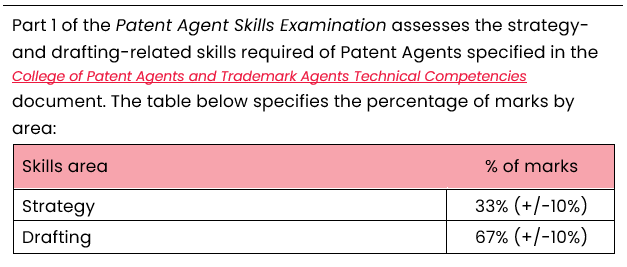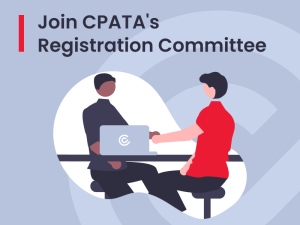CPATA’s Registration Committee has approved the Test Specifications for the Skills Examination components of the new qualifying examinations for patent agents and trademark agents.
CPATA develops each qualifying examination using a set of test specifications. Using test specifications helps to ensure that the qualifying examinations test defensibly and consistently.
Test specifications outline what an exam will measure in terms of content domain (e.g., areas and weights), as well as guidelines on how the content is to be measured. Such guidelines are expressed in term of structure (e.g., format, length, and cognitive level) and context (e.g., the circumstances in which examination questions are framed and that can influence their interpretation).
Why is CPATA redeveloping the qualifying examinations?
A core part of CPATA’s mandate is to ensure that the public has access to patent agents and trademark agents who have the necessary skills and knowledge to serve their clients effectively. We aim to make the IP agent profession an attractive one for those with an interest in intellectual property by setting clear expectations in the form of technical competency profiles and administering transparent, objective, impartial, and fair registration programs, policies and procedures for licensing, including a defensible entry-to-practice framework.
With these goals in mind, CPATA will implement new qualifying examinations for Class 3 agents-in-training to become Class 1 active licensees starting with the Knowledge Examinations in March 2024, followed by the Skills Exams in the Fall of 2024. The new exams will strive to minimize unintended barriers to entry into the profession while evaluating candidate knowledge and skills, as outlined in the technical competency profiles, more accurately.
What process is CPATA employing to develop the new exams?
After adopting the new technical competency profiles for patent agents and trademark agents, CPATA began the process of redeveloping the qualifying examinations to test for these competencies. The exams are being developed by working groups comprised of practicing licensees, with the oversight of an external consulting team of expert psychometricians.
The starting point for the test specification development process was data from the technical competency validation survey conducted in fall 2022, which indicated which areas of knowledge current practitioners use most in their day-to-day practice. Through several meetings and surveys, the working groups developed the test specifications which were approved by the Registration Committee at their March 31, 2023, meeting.
With the approved test specifications, examination advisory group members have been working on developing the 2024 knowledge examinations and the blueprints for the skills examinations, which will be administered in the fall of 2024. Sample questions for the Knowledge examinations are scheduled to be postedin November and the sample skills examinations are scheduled to be posted in the late winter/early spring of 2024.
Understanding the Test Specifications
Cognitive levels. Competencies must be measured at the level(s) of cognitive ability appropriate to a test’s purpose. Thisincludes lower-order cognitive levels (i.e., remember or understand), intermediate cognitive levels (i.e., apply or analyze), and higher-order cognitive levels (i.e., evaluate or create).
Question format. There are various assessment vehicles or formats, each with distinct advantages and disadvantages. Some formats include selected-response items, constructed-response items, and performance-based tasks. The optimal format depends on a variety of factors. Typically, selected-response items (specifically, well-constructed, standardized multiple-choice questions) are most effective at assessing knowledge-focused competencies. For competencies that relate to skills, or when testing knowledge at higher-order cognitive levels, constructed-response and performance-based items are preferable.
Examination length. Once it is clear what content is to be assessed, at what cognitive level(s), and by what assessment vehicle, other decisions (such as exam length) can be made. Such decisions consider validity of score interpretations (e.g., the extent to which scores obtained from the test accurately and appropriately draw valid conclusions about test-taker performance), reliability (e.g., consistency of content and results across sittings), and fairness (e.g., maximizing accessibility for all test-takers).
What will the new qualifying examinations be like starting in 2024?
Patent Agent
To become licensed as a Patent Agent, a person (in addition to meeting other requirements) must successfully complete the following qualifying examinations:
- Patent Knowledge Examination
- Patent Agent Skills Examination Part 1
- Patent Agent Skills Examination Part 2
The Patent Knowledge Examination evaluates the patent-related, knowledge-based technical competencies. A test-taker must successfully demonstrate competence on the Knowledge Examination before attempting the Agent Skills Examination.
The Patent Agent Skills Examination Part 1 and the Patent Agent Skills Examination Part 2 are independent components that make up the full Patent Agent Skills Examination. . Each evaluates a subset of the patent-related, skills-based technical competencies.
Overview of the Patent Agent Skills Examination Test Specifications
Part 1


Test-takers have 6 hours to complete Part 1 of the Patent Agent Skills Examination. Test-takers complete the computer-administered examination over 2 days. Test-takers have 3 hours on one day to complete the first component and 3 hours on a subsequent day to complete the second component. The 2 components are scored together as a single examination.
Items may include both constructed-response questions and performance-based (written) tasks. The examination uses a limited open-book format, with test-takers receiving electronic access to the Patent Act, RSC 1985, c P-4 and Patent Rules, SOR/2019-251.
Candidates who are successful with Part 1 (Components A and B) will be able to carry forward the successful attempt to future administrations if they are not successful on Part 2.
Part 2
Part 2 of the Patent Agent Skills Examination assesses the prosecution-, validity-, and infringement-related skills required of Patent Agents specified in the College of Patent Agents and Trademark Agents Technical Competencies document. The table below specifies the percentage of marks by area:

Test-takers have 6 hours to complete Part 2 of the Patent Agent Skills Examination. Test-takers complete the computer-administered examination over 2 days. Test-takers have 3 hours on one day to complete the first component and 3 hours on a subsequent day to complete the second component. The 2 components are scored together as a single examination.
Items may include both constructed-response questions and performance-based (written) tasks. The examination uses a limited open-book format, with test-takers receiving electronic access to the Patent Act, RSC 1985, c P-4 and Patent Rules, SOR/2019-251.

Candidates who are successful with Part 2 (Components A and B) will be able to carry forward the successful attempt to future administrations if they are not successful on Part 1.
Overview of the Trademark Agent Skills Examination Test Specifications
The Trademark Agent Skills Examination assesses the skills required of Trademark Agents specified in the College of Patent Agents and Trademark Agents Technical Competencies document. The table below specifies the percentage of marks by area:

Test-takers have 6 hours to complete the Trademark Agent Skills Examination. Test-takers complete the computer-administered examination over 2 days. Items may include both constructed-response questions and performance-based (written) tasks.
Test-takers have 3 hours on one day to complete the first component and 3 hours on a subsequent day to complete the second component. The 2 components are scored together as a single examination.
The examination uses a limited open-book format, with test-takers receiving electronic access to the Trademarks Act, RSC 1985, c T-13 and Trademarks Regulations, SOR/2018-227.

The two components are scored as a single exam, and therefore, both components must be successfully completed in one administration. There is no carry forward into future administrations.
Why are the skills exams in written format rather than multiple choice like the knowledge exams?
Each examination consists of items in which test-takers are asked to write or “construct” the correct answer.
Written exams allow test-takers to demonstrate more in-depth or complex competencies because there is no pre-drafted response to select. The tasks are used to assess the ability to integrate or translate competencies into effective performance in practice.
Why are the skills exams limited open-book?
For skills-based exams, an open-book format allows for a more authentic demonstration of the relevant skill.
Why are the skills exams 3 hours in length per day?
The skills examinations will be developed such that competent test-takers can comfortably complete them during this time, bearing in mind that time pressure is NOT a tested construct on this examination.
Questions
For any questions, please contact registration-inscription@cpata-cabamc.ca






